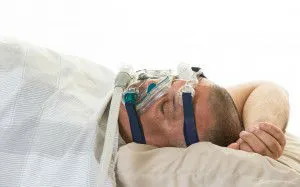For some people, having sleep apnea may be obvious. Your partner might complain about your snoring keeping him or her awake, or you may get up in the morning feeling as if you haven’t slept. For other people, however, the problem may not be as easy to pinpoint.
Sleep apnea is a health disorder in which the sufferer stops breathing while they’re asleep – sometimes hundreds of times throughout the night, disrupting sleep enough to leave them groggy and also at an increased risk for a number of more serious health problems. Those who go undiagnosed, may ultimately develop diabetes or depression, and also have an increased risk of stroke and heart attack as well as other health issues.
Six common signs of sleep apnea:
- Excessive daytime sleepiness
- Loud snoring
- Waking up with a dry mouth or sore throat
- Suffering from headaches in the morning
- Difficulty staying asleep
- Problems focusing or concentrating during the day
Men who are over the age of 40, those who are overweight, have a family history of sleep apnea, allergies, sinus problems, a large tongue or any nasal obstruction are at an increased risk for sleep apnea.
In some cases, sleep apnea can be resolved with medical intervention by following these self-care remedies:
Lose weight. Losing those stubborn extra pounds and returning to a normal weight may resolve the issue.
Sleeping on your side. This can help to prevent your tongue and soft palate from sliding back and causing your airway to be blocked. To prevent from turning onto your back while sleeping, you might sew a tennis ball into the back of a pajama top.
Avoid drinking alcohol, especially at night. Alcohol relaxes the muscles in the back of your throat which can interfere with your breathing rhythm. Sleeping pills should be avoided for the same reason. If you have trouble falling asleep, trying drinking an herbal tea, practicing deep-breathing exercises. Blocking out all light as well as noise before going to bed at night can also help.
Avoid chewing food on one side of the mouth. When eating, chew your food on both sides, keeping your tongue on the palate while avoiding opening your mouth while chewing. This helps to reinforce the functionality and movement of your tongue and jaw, which helps reduce sleep apnea symptoms.

Use a saline spray. Using a saline nasal spray before bed can help keep your nasal passages open at night. You may need to speak with your healthcare provider if you plan to use a nasal decongestant or antihistamine as these medications are generally recommended only for a short period.
Don’t smoke. Quitting your cigarette habit will not only significantly improve your health and decrease your risk for numerous diseases and chronic illness, it can also help resolve sleep apnea.
If taking these measures doesn’t resolve your problem, be sure to see a medical professional as sleep apnea can be a serious condition.
-The Alternative Daily
